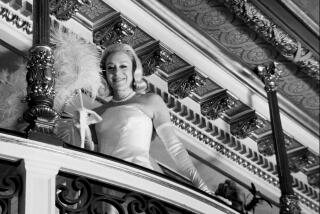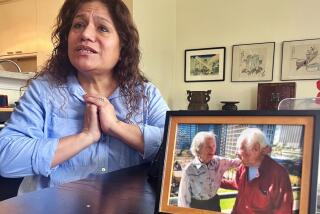Robert De Niro, Michelle Pfeiffer wrestle with the tragic tale of Bernie Madoff in HBO’s ‘Wizard of Lies’
New York — Travis Bickle. Jake LaMotta. Vito Corleone. And now, Bernie Madoff.
Robert De Niro has played some frightening characters in his day, but in “The Wizard of Lies,” premiering Saturday on HBO, he reaches terrifying new heights as one of the country’s most notorious real-life villains, perpetrator of what’s thought to be the greatest financial fraud in American history and a one-man stand-in for Wall Street greed.
“He’s different. He’s not a physically scary person,” says De Niro, in a joint interview with director Barry Levinson and co-star Michelle Pfeiffer, who plays Madoff’s fragile wife, Ruth. “It’s a whole ’nother thing. People felt confident in him. ‘Don’t worry. Bernie will take care of it.’ ”
A former Nasdaq chairman once revered for his uncanny ability to yield safe-but-steady returns for his investors, Madoff became an instant pariah when his $65 billion Ponzi scheme was revealed in December 2008. The fraud, perpetrated for decades, upended the lives of thousands, including Hollywood luminaries, retired schoolteachers and famed Holocaust survivors.
But unlike the ABC miniseries “Madoff,” which aired last year, the film doesn’t delve into the nitty-gritty history of Madoff’s decades-long con, focusing instead on the immediate run-up to and aftermath of the scheme’s exposure. The result is a domestic tragedy that unequivocally portrays Ruth and sons Mark and Andrew (played by Alessandro Nivola and Nathan Darrow) as innocent victims of a man with possible sociopathic tendencies.
De Niro’s Madoff is a controlling father who dictates everything in his family’s life, down to what his grown sons eat for dinner. While cultivating a reputation as a financial magician, he also stokes feelings of inadequacy in Andrew and Mark — who ran a legitimate trading business — by excluding them from his secretive investment firm two floors below.
This film is based on the nonfiction book “The Wizard of Lies: Bernie Madoff and the Death of Trust” by New York Times reporter Diana Henriques, with additional details from Laurie Sandell’s “Truth and Consequences: Life Inside the Madoff Family.”
During a pivotal scene, Madoff bristles at a news story likening him to serial killer Ted Bundy. “How can you compare me to someone who decapitated women and kept their heads as mementos?” he asks incredulously, but it doesn’t seem like too much of a stretch.
“This isn’t a man with a gun, but ultimately he is as destructive to the lives of many people as a man with a gun,” says Levinson, who previously collaborated with De Niro on films including “Wag the Dog” and “Sleepers.” “His corruption ultimately destroys his family and then the financial lives of all these other people.”
Working from a script co-written by his son, Sam Levinson, the director took inspiration from “All My Sons,” Arthur Miller’s post-war play about how a father’s greed and deception destroys his family.
When the Ponzi scheme fell apart following the financial collapse of 2008, the sons turned their father into the authorities, but they were, along with their mother, hounded by the media and targeted in numerous lawsuits. Amid widespread anger at Wall Street, Madoff “became the face of a sweeping sense of betrayal of trust,” says Henriques, which led to ruin for those closest to him.
Elder son Mark committed suicide in 2010 on the second anniversary of his father’s arrest. Younger son Andrew died in 2014 after a battle with lymphoma that had been in remission before the scandal erupted. More than eight years later, the venom directed at the Madoff family has not entirely dissipated. Just this week, the New York Post ran a story about the “sad new life of exiled Ruth,” which included details about her spending habits and gossipy quotes from unnamed neighbors.
“They were decimated by it,” says Henriques, who has interviewed Madoff in prison on multiple occasions and appears in the film as herself, “and this movie makes that clear.” (In a montage narrated by Henriques, “The Wizard of Lies” also acknowledges Madoff’s many other victims.)
Nivola describes Mark’s relationship with his father as abusive yet loving — “a great paradox.”
“Partly in an effort to disguise the Ponzi scheme and partly just to maintain his power in the family, he never made Mark feel like he was fit to inherit the throne,” Nivola says by phone. “It was a constant feeling of being undermined by somebody who Mark idolized.”
Equally worshipful is Ruth. Pfeiffer gives a tragicomic performance as a sheltered woman who seems to subsist on cigarettes and glasses of chardonnay, and is left reeling when her financial titan husband is revealed as a world-class swindler. Ruth’s sons resent her inability to cut ties with Madoff, but Pfeiffer was able to empathize.
“You have to remember that Ruth was a child when she met Bernie,” she says. “When you love someone that deeply for that long, you can’t just walk away from them.”
Pfeiffer says she was initially concerned about participating in something that would potentially dredge up painful memories, but ultimately was drawn by the chance to exonerate Ruth and her sons, who were “really convicted in the court of public opinion and in the media.”
“I think we’ve done that, and I’m proud of that, for all of them,” she adds.
Pfeiffer met with Ruth Madoff for about an hour — not to pry or ask questions, but simply to observe.
“I was surprised that she was actually willing to meet me. Then she said, ‘Well, I would expect anyone who’s playing me to want to meet me. That would be crazy,’ ” Pfeiffer recalls. “But she’s very pragmatic and very straightforward, which I find incredibly refreshing. Doesn’t beat around the bush.”
As to whether Ruth has been able to rebuild following the scandal and the destruction it wrought on her family, Pfeiffer replies, “I got the sense she’s trying.”
Unlike Pfeiffer, De Niro did not meet the person he’s portraying. Even now, Madoff is a figure known to most via silent mugshots or still paparazzi photographs, and there are few extant videos of him before his crime became public — part of a carefully constructed persona of exclusivity, says De Niro. “He had a way of being more, ‘You come to me.’ His reputation preceded him.”
The actor leaned on Henriques as a critical secondary source of information about Madoff’s every gesture — the way he laughed, the way he held his hands, the way he wore his glasses. (She calls De Niro “a vacuum cleaner.”)
In his view, Madoff was, if not a full-blown sociopath, then a man with an inability to concede error that spirals out of control.
“I felt that he got slowly into something that he couldn’t back out of, and he just took advantage more and more. He was always jumping from one stone to another,” says De Niro, adding that “maybe he had a little bit of disdain for the people that he was servicing.”
The comment hints at one of the film’s subtler themes: class. Madoff, raised in Queens, rises to the top of the Manhattan financial world and lives in an elegant Upper East Side penthouse, but his Ponzi scheme operates out of a cluttered, bunker-like office full of brash outer-borough personalities, including his primary conspirator, Frank DiPascali (Hank Azaria).
“Bernie was pathologically determined to succeed,” Henriques says. “Among the seven deadly sins, I would exonerate him of greed and indict him for pride. ... It was about being admired, respected, adulated, looked up to as this brilliant trader. That’s what makes the story so tragic: You lose everything because you didn’t want to ever admit that you’d failed at anything.”
See the most-read stories in Entertainment this hour »
‘The Wizard of Lies’
Where: HBO
When: 8 p.m. Saturday
Rating: TV-MA (may be unsuitable for children under the age of 17)
Follow me @MeredithBlake
More to Read
The complete guide to home viewing
Get Screen Gab for everything about the TV shows and streaming movies everyone’s talking about.
You may occasionally receive promotional content from the Los Angeles Times.






